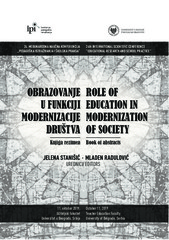Приказ основних података о документу
Standardi za merenje uspeha učenika: izazovi u obrazovanju
Standards for student achievement - challenges for education
| dc.contributor | Stanišić, Jelena | |
| dc.contributor | Radulović, Mladen | |
| dc.creator | Vrcelj, Sofija | |
| dc.creator | Mrnjaus, Kornelija | |
| dc.creator | Jalušić, Anđelka | |
| dc.date.accessioned | 2021-07-20T09:13:01Z | |
| dc.date.available | 2021-07-20T09:13:01Z | |
| dc.date.issued | 2019 | |
| dc.identifier.isbn | 978-86-7447-147-0 | |
| dc.identifier.uri | http://ipir.ipisr.org.rs/handle/123456789/550 | |
| dc.description.abstract | Škole se širom sveta nalaze pred novim zahtevima, a jedan od njih, posebno izražen u neoliberalnoj eri i kulturi revizije, jeste standardizacija uspeha učenika preuzeta iz sveta ekonomije. Mišljenja o standardizaciji uspeha učenika ili škola su podeljena. Sistematski smo analizirali relevantnu literaturu kako bismo istražili različita viđenja standarda. Standardi se smatraju dobrim pokazateljima koji omogućavaju poređnje među državama i pružaju smernice za inovacije i/ili reforme, pošto su obrazovni sistemi tradicionalno zasnovani na implicitnim standardima. Postavljanje eksplicitnih standarda olakšava posao nastavnicima i učenicima jer znaju šta se od njih očekuje. Osnovu ovakvog pristupa čini verovanje političara da mogu jasno prepoznati šta bi studenti trebalo da znaju i za šta bi trebalo da budu osposobljeni. Protivnici ovakvom mišljenju smatraju da je postavljanje eksplicitnih standarda inherentno štetno jer može umanjiti kvalitet onoga što se meri. Standardi se ne odnose na potpunu valorizaciju studenata, niti na kompetencije važne za uključivanje u svet rada. Uspeh učenika ima višestruke ciljeve koji se ne odražavaju u standardizovanim testovima, a moguće je i preusmeravanje resursa s jedne grupe učenika na druge, što često nije opravdano ili transparentno. Standardizacija uspeha učenika stvorena je analogijom sa privredom po kojoj studenti postaju ,,proizvodi”, a njihovo ponašanje se definiše kao ,,izlazne veštine”, ,,kompetencije” i ,,ishodi”. Postavljanje standarda počiva na implicitnoj pretpostavci da je obrazovni proces kulturološki neutralan i da ne uzima u obzir etničku pripadnost i društvenu klasu, ali pokušava da homogenizuje učenike stavljajući ih u kvantifikovane kategorije. Sam koncept standarda je nejasan. Stoga, standardizacija baca senku na romantičnu predstavu o poslovnom sektoru kao primeru dobre prakse i iziskuje redefinisanje cilja i svrhe obrazovanja. | sr |
| dc.description.abstract | There are new demands for schools around the world, and one of them, particularly expressed in the neoliberal era and audit culture, is standardization of student achievements that has been transferred from the world of economics. The opinions about standardization of student or academic achievements are not united. We used systematic analysis of relevant literature to explore different perspectives on standards. Standards are considered to be a good indicator that allows cross-national comparisons and provides guidance for innovation and/or reform, since education systems are traditionally based on implicit standards. Setting explicit standards makes work easier for teachers and students because they know what is expected from them. The basic foundation of this approach is the politicians’ conviction that they can clearly identify what students need to know and what they need to be capable of. The opponents believe that setting explicit standards is inherently damaging because it can reduce the quality of what is measured. Standards do not allow for full valorisation of students or competences that are important for inclusion in the world of work. Student achievement has multiple goals that are not reflected in standardized tests, and it is also possible to redirect resources from one group of students to others, which is often not justified or transparent. Standardization of student achievement was created by analogy to industry, whereby students become “products”, and their behaviour is defined as “exit skills”, “competences” and “outcomes”. Setting standards rests on the implicit assumption that educational process is culturally neutral and does not take into account ethnicity and social class, but tries to homogenize students by placing them in quantified categories. The mere construct standard, is not clear. For this reason, standardization casts a shadow on romantic presentation of the business sector as the example of good practice, and requires redefining the goal and purpose of education. | sr |
| dc.language.iso | sr | sr |
| dc.language.iso | en | sr |
| dc.publisher | Beograd : Institut za pedagoška istraživanja | sr |
| dc.rights | openAccess | sr |
| dc.rights.uri | https://creativecommons.org/licenses/by/4.0/ | |
| dc.source | Obrazovanje u funkciji modernizacije društva | sr |
| dc.subject | standardi | sr |
| dc.subject | uspeh | sr |
| dc.subject | kultura revizije | sr |
| dc.subject | kompetencije | sr |
| dc.subject | ishodi | sr |
| dc.subject | standards | sr |
| dc.subject | achievement | sr |
| dc.subject | audit culture | sr |
| dc.subject | competences | sr |
| dc.subject | outcomes | sr |
| dc.title | Standardi za merenje uspeha učenika: izazovi u obrazovanju | sr |
| dc.title | Standards for student achievement - challenges for education | sr |
| dc.type | conferenceObject | sr |
| dc.rights.license | BY | sr |
| dc.citation.epage | 49 | |
| dc.citation.spage | 48 | |
| dc.description.other | Zbornik rezimea / 24. Međunarodna naučna konferencija "Pedagoška istraživanja i školska praksa | sr |
| dc.description.other | Book of abstracts / 24th International Scientific Conference "Educational Research and School Practice" | |
| dc.identifier.fulltext | http://ipir.ipisr.org.rs/bitstream/id/1648/Standardi_za_merenje_uspeha_2019.pdf | |
| dc.identifier.rcub | https://hdl.handle.net/21.15107/rcub_ipir_550 | |
| dc.type.version | publishedVersion | sr |

